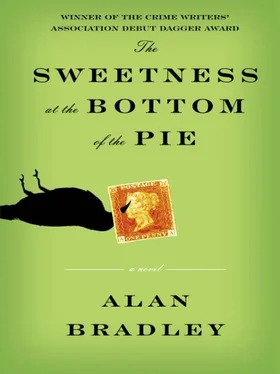Alan Bradley - The Sweetness at the Bottom of the Pie
Здесь есть возможность читать онлайн «Alan Bradley - The Sweetness at the Bottom of the Pie» весь текст электронной книги совершенно бесплатно (целиком полную версию без сокращений). В некоторых случаях можно слушать аудио, скачать через торрент в формате fb2 и присутствует краткое содержание. Жанр: Старинная литература, на английском языке. Описание произведения, (предисловие) а так же отзывы посетителей доступны на портале библиотеки ЛибКат.
- Название:The Sweetness at the Bottom of the Pie
- Автор:
- Жанр:
- Год:неизвестен
- ISBN:нет данных
- Рейтинг книги:3 / 5. Голосов: 1
-
Избранное:Добавить в избранное
- Отзывы:
-
Ваша оценка:
- 60
- 1
- 2
- 3
- 4
- 5
The Sweetness at the Bottom of the Pie: краткое содержание, описание и аннотация
Предлагаем к чтению аннотацию, описание, краткое содержание или предисловие (зависит от того, что написал сам автор книги «The Sweetness at the Bottom of the Pie»). Если вы не нашли необходимую информацию о книге — напишите в комментариях, мы постараемся отыскать её.
The Sweetness at the Bottom of the Pie — читать онлайн бесплатно полную книгу (весь текст) целиком
Ниже представлен текст книги, разбитый по страницам. Система сохранения места последней прочитанной страницы, позволяет с удобством читать онлайн бесплатно книгу «The Sweetness at the Bottom of the Pie», без необходимости каждый раз заново искать на чём Вы остановились. Поставьте закладку, и сможете в любой момент перейти на страницу, на которой закончили чтение.
Интервал:
Закладка:
It had been a long day, and my eyelids felt as if they'd been used for oyster rakes.
"I think I'll go to bed," I said. "G'night, Feely. G'night, Daffy."
My attempt at sociability was greeted with silence and a grunt. As I was making my way up the stairs, Dogger materialized suddenly above me on the landing with a candleholder that might have been snapped up at an estate sale at Manderley.
"Colonel de Luce?" he whispered.
"He is well, Dogger," I said.
Dogger nodded a troubled nod, and we each of us trudged off to our respective quarters.
18
GREYMINSTER SCHOOL LAY DOZING IN THE SUN, AS if it were dreaming of past glories. The place was precisely as I had imagined it: magnificent old stone buildings, tidy green lawns running down to the lazy river, and vast, empty playing fields that seemed to give off silent echoes of cricket matches whose players were long dead.
I leaned Gladys against a tree in the side lane by which I had entered the grounds. Behind a hedgerow, a tractor stood ticking idly, its driver nowhere in sight.
The voices of choirboys came floating across the lawns from the chapel. In spite of the bright morning sunshine, they were singing:
"Softly now the light of day
Fades upon my sight away—”
I stood listening for a moment until suddenly they broke off. Then, after a pause, the organ started up again, peevishly, and the singers went back to the beginning.
As I walked slowly across the grass of what I'm sure Father would have called “the Quad,” the tall blank windows of the school stared down at me coldly and I had the sudden queer feeling an insect must have when it's placed under a microscope—the feeling of an invisible lens hovering, and something strange, perhaps, about the light.
Except for a single schoolboy dashing along and two black-gowned masters walking and talking with their heads together, the broad lawns and winding walkways of Greyminster were empty beneath a sky of deepest blue. The whole place seemed slightly unreal, like a grossly enlarged Agfacolor print: something you might see in one of those books with a name such as Picturesque Britain .
That limestone pile on the east side of the Quad—the one with the clock tower—must be Anson House, I thought: Father's old digs.
As I approached it, I raised my hand to shield my eyes against the glare of the sky. It was from somewhere up there among the battlements and tiles that Mr. Twining had plummeted to his death on the cobbles below; those ancient cobbles which now lay no more than a hundred feet from where I was standing.
I strolled across the grass to have a look.
Disappointingly, there were no bloodstains. Of course there wouldn't be, not after all these years. Those would have been washed away as soon as was decently possible—quite likely even before Mr. Twining's broken body had been laid to whatever passed for rest.
Other than of their constant wearing down by two hundred years of privileged feet, these cobbles told no tales. Tucked tightly in along the stone walls of Anson House, the walk was scarcely six feet wide.
I threw back my head and gazed straight up at the tower. Viewed from this angle, it rose dizzily in a sheer wall of stone that ended far, far above me in a filigree of airy ornamental stonework where fat white clouds, drifting lazily past the parapets, created the peculiar sensation that the whole structure was leaning… falling… toppling towards me. The illusion made my stomach go all queasy, and I had to look away.
Worn stone steps led enticingly from the cobbled walk, through an arched entrance, to a double door. To my left was the porter's lodge, its occupant huddled over a telephone. He did not even look up as I slipped inside.
A cool, dim corridor stretched away in front of me, to infinity it seemed, and I set out along it, lifting my feet carefully to keep from making scuffing noises on the slate floor.
On either side, a long gallery of smiling faces—some of them schoolboys and some masters—receded into the darkness, each one a Greyminsterian who had given his life for his country, and each in his own black-lacquered frame: “That Others Might Live,” it said on a gilded scroll. At the end of the corridor, set apart from the others, were photographs of three boys, their names engraved in red on little brass rectangles. Under each name were the words Missing in Action .
"Missing in Action?" Why wasn't Father's photo hanging there? I wondered.
Father was generally as absent as these young men whose bones were somewhere in France. I felt a little guilty at the thought, but it was true.
I think it was at that moment, there in the shadowy hall at Greyminster, that I began to realize the full extent of Father's distant nature. Yesterday I had been all too ready to throw my arms around him and hug him to jelly, but now I understood that yesterday's cozy prison scene had not been a dialogue, but a troubled monologue. It had not been me, but Harriet to whom he was speaking. And, as with the dying Horace Bonepenny, I had been no more than an unwitting confessor.
Now, just being here at Greyminster where Father's troubles had begun, it seemed all the more cold and remote and inhospitable a place.
In the gloom beyond the photos, a staircase led up to the first floor, and I climbed up it to a hallway which, like the one I had left below, also ran the length of the building. Although the doors on either side were closed, each one was fitted with a small pane of glass, which allowed me a peek into the room. They were classrooms, and all alike.
At the end of the corridor, a large corner room promised something more: A sign on its door read Chemistry Lab.
I tried the door and it opened at once. The curse was broken!
I don't know what I was expecting, but I wasn't expecting this: stained wooden tables, boring flasks, cloudy retorts, chipped test tubes, inferior Bunsen burners, and a colored wall chart of the elements containing a laughable printing error in which the positions of arsenic and selenium were interchanged. I spotted this at once and—with a nub of blue chalk from the ledge beneath the blackboard—took the liberty of correcting the mistake by drawing in a two-headed arrow. “WRONG!” I wrote beneath it, and underlined the word twice.
This so-called lab was nothing compared with my own at Buckshaw, and at the thought, my chest swelled with pride. I wanted nothing more than to bolt for home at once, just to be there, to touch my own gleaming glassware; to concoct the perfect poison just for the thrill of it.
But that pleasure would have to wait. There was work to be done.
BACK OUTSIDE IN THE CORRIDOR, I retraced my steps to the center of the building. If I had guessed accurately, I should now be directly under the tower, and the entrance to it could not be far away.
A small door in the paneling, which I had taken at first to be a broom closet, swung open to reveal a steep stone staircase. My heart skipped a beat.
And then I saw the sign. A few steps up from the bottom, a length of chain was draped across the steps, with a hand-printed card: Tower Off Limits—Strictly Enforced .
I was up them like a shot.
It was like being inside a nautilus shell. The stairs twisted round and round, winding their narrow way upwards in echoing sameness. There was no possible way of seeing what lay ahead or, for that matter, what lay behind. Only the few steps immediately above and below me were visible.
For a while, I counted them in a whisper as I climbed, but after a time I found that I needed my breath to fuel my legs. It was a steep ascent and I was getting a stitch in my side. I stopped for a moment to rest.
What little light there was appeared to be coming from tiny slit windows, one positioned at each complete turn of the staircase. On that side of the tower, I guessed, lay the Quad. Still short of breath, I resumed my ascent.
Читать дальшеИнтервал:
Закладка:
Похожие книги на «The Sweetness at the Bottom of the Pie»
Представляем Вашему вниманию похожие книги на «The Sweetness at the Bottom of the Pie» списком для выбора. Мы отобрали схожую по названию и смыслу литературу в надежде предоставить читателям больше вариантов отыскать новые, интересные, ещё непрочитанные произведения.
Обсуждение, отзывы о книге «The Sweetness at the Bottom of the Pie» и просто собственные мнения читателей. Оставьте ваши комментарии, напишите, что Вы думаете о произведении, его смысле или главных героях. Укажите что конкретно понравилось, а что нет, и почему Вы так считаете.












